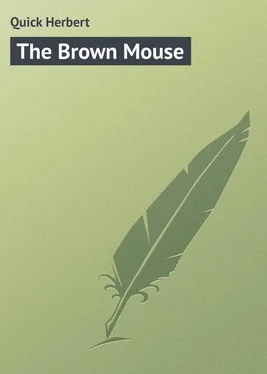Herbert Quick - The Brown Mouse
Здесь есть возможность читать онлайн «Herbert Quick - The Brown Mouse» — ознакомительный отрывок электронной книги совершенно бесплатно, а после прочтения отрывка купить полную версию. В некоторых случаях можно слушать аудио, скачать через торрент в формате fb2 и присутствует краткое содержание. Жанр: Зарубежные любовные романы, foreign_prose, foreign_language, на английском языке. Описание произведения, (предисловие) а так же отзывы посетителей доступны на портале библиотеки ЛибКат.
- Название:The Brown Mouse
- Автор:
- Жанр:
- Год:неизвестен
- ISBN:нет данных
- Рейтинг книги:4 / 5. Голосов: 1
-
Избранное:Добавить в избранное
- Отзывы:
-
Ваша оценка:
- 80
- 1
- 2
- 3
- 4
- 5
The Brown Mouse: краткое содержание, описание и аннотация
Предлагаем к чтению аннотацию, описание, краткое содержание или предисловие (зависит от того, что написал сам автор книги «The Brown Mouse»). Если вы не нашли необходимую информацию о книге — напишите в комментариях, мы постараемся отыскать её.
The Brown Mouse — читать онлайн ознакомительный отрывок
Ниже представлен текст книги, разбитый по страницам. Система сохранения места последней прочитанной страницы, позволяет с удобством читать онлайн бесплатно книгу «The Brown Mouse», без необходимости каждый раз заново искать на чём Вы остановились. Поставьте закладку, и сможете в любой момент перейти на страницу, на которой закончили чтение.
Интервал:
Закладка:
Quick Herbert
The Brown Mouse
CHAPTER I
A MAIDEN’S “HUMPH”
A Farm-hand nodded in answer to a question asked him by Napoleon on the morning of Waterloo. The nod was false, or the emperor misunderstood – and Waterloo was lost. On the nod of a farm-hand rested the fate of Europe.
This story may not be so important as the battle of Waterloo – and it may be. I think that Napoleon was sure to lose to Wellington sooner or later, and therefore the words “fate of Europe” in the last paragraph should be understood as modified by “for a while.” But this story may change the world permanently. We will not discuss that, if you please. What I am endeavoring to make plain is that this history would never have been written if a farmer’s daughter had not said “Humph!” to her father’s hired man.
Of course she never said it as it is printed. People never say “Humph!” in that way. She just closed her lips tight in the manner of people who have a great deal to say and prefer not to say it, and – I dislike to record this of a young lady who has been “off to school,” but truthfulness compels – she grunted through her little nose the ordinary “Humph!” of conversational commerce, which was accepted at its face value by the farm-hand as an evidence of displeasure, disapproval, and even of contempt. Things then began to happen as they never would have done if the maiden hadn’t “Humphed!” and this is a history of those happenings.
As I have said, it may be more important than Waterloo. Uncle Tom’s Cabin was, and I hope – I am just beginning, you know – to make this a much greater book than Uncle Tom’s Cabin . And it all rests on a “Humph!” Holmes says,
“Soft is the breath of a maiden’s ‘Yes,’
Not the light gossamer stirs with less.”
but what bard shall rightly sing the importance of a maiden’s “Humph!” when I shall have finished telling what came of what Jennie Woodruff said to Jim Irwin, her father’s hired man?
Jim brought from his day’s work all the fragrances of next year’s meadows. He had been feeding the crops. All things have opposite poles, and the scents of the farm are no exception to the rule. Just now, Jim Irwin possessed in his clothes and person the olfactory pole opposite to the new-mown hay, the fragrant butter and the scented breath of the lowing kine – perspiration and top-dressing.
He was not quite so keenly conscious of this as was Jennie Woodruff. Had he been so, the glimmer of her white piqué dress on the bench under the basswood would not have drawn him back from the gate. He had come to the house to ask Colonel Woodruff about the farm work, and having received instructions to take a team and join in the road work next day, he had gone down the walk between the beds of four o’clocks and petunias to the lane. Turning to latch the gate, he saw through the dusk the white dress under the tree and drawn by the greatest attraction known in nature, had re-entered the Woodruff grounds and strolled back.
A brief hello betrayed old acquaintance, and that social equality which still persists in theory between the work people on the American farm and the family of the employer. A desultory murmur of voices ensued. Jim Irwin sat down on the bench – not too close, be it observed, to the piqué skirt… There came into the voices a note of deeper earnestness, betokening something quite aside from the rippling of the course of true love running smoothly. In the man’s voice was a tone of protest and pleading…
“I know you are,” said she; “but after all these years don’t you think you should be at least preparing to be something more than that?”
“What can I do?” he pleaded. “I’m tied hand and foot… I might have …”
“You might have,” said she, “but, Jim, you haven’t … and I don’t see any prospects…” “I have been writing for the farm papers,” said Jim; “but …”
“But that doesn’t get you anywhere, you know… You’re a great deal more able and intelligent than Ed – and see what a fine position he has in Chicago…”
“There’s mother, you know,” said Jim gently.
“You can’t do anything here,” said Jennie. “You’ve been a farm-hand for fifteen years … and you always will be unless you pull yourself loose. Even a girl can make a place for herself if she doesn’t marry and leaves the farm. You’re twenty-eight years old.”
“It’s all wrong!” said Jim gently. “The farm ought to be the place for the best sort of career – I love the soil!”
“I’ve been teaching for only two years, and they say I’ll be nominated for county superintendent if I’ll take it. Of course I won’t – it seems silly – but if it were you, now, it would be a first step to a life that leads to something.”
“Mother and I can live on my wages – and the garden and chickens and the cow,” said Jim. “After I received my teacher’s certificate, I tried to work out some way of doing the same thing on a country teacher’s wages. I couldn’t. It doesn’t seem right.”
Jim rose and after pacing back and forth sat down again, a little closer to Jennie. Jennie moved away to the extreme end of the bench, and the shrinking away of Jim as if he had been repelled by some sort of negative magnetism showed either sensitiveness or temper.
“It seems as if it ought to be possible,” said Jim, “for a man to do work on the farm, or in the rural schools, that would make him a livelihood. If he is only a field-hand, it ought to be possible for him to save money and buy a farm.”
“Pa’s land is worth two hundred dollars an acre,” said Jennie. “Six months of your wages for an acre – even if you lived on nothing.”
“No,” he assented, “it can’t be done. And the other thing can’t, either. There ought to be such conditions that a teacher could make a living.”
“They do,” said Jennie, “if they can live at home during vacations. I do.”
“But a man teaching in the country ought to be able to marry.”
“Marry!” said Jennie, rather unfeelingly, I think. “ You marry!” Then after remaining silent for nearly a minute, she uttered the syllable – without the utterance of which this narrative would not have been written. “ You marry! Humph!”
Jim Irwin rose from the bench tingling with the insult he found in her tone. They had been boy-and-girl sweethearts in the old days at the Woodruff schoolhouse down the road, and before the fateful time when Jennie went “off to school” and Jim began to support his mother. They had even kissed – and on Jim’s side, lonely as was his life, cut off as it necessarily was from all companionship save that of his tiny home and his fellow-workers of the field, the tender little love-story was the sole romance of his life. Jennie’s “Humph!” retired this romance from circulation, he felt. It showed contempt for the idea of his marrying. It relegated him to a sexless category with other defectives, and badged him with the celibacy of a sort of twentieth-century monk, without the honor of the priestly vocation. From another girl it would have been bad enough, but from Jennie Woodruff – and especially on that quiet summer night under the linden – it was insupportable.
“Good night,” said Jim – simply because he could not trust himself to say more.
“Good night,” replied Jennie, and sat for a long time wondering just how deeply she had unintentionally wounded the feelings of her father’s field-hand; deciding that if he was driven from her forever, it would solve the problem of terminating that old childish love affair which still persisted in occupying a suite of rooms all of its own in her memory; and finally repenting of the unpremeditated thrust which might easily have hurt too deeply so sensitive a man as Jim Irwin. But girls are not usually so made as to feel any very bitter remorse for their male victims, and so Jennie slept very well that night.
Читать дальшеИнтервал:
Закладка:
Похожие книги на «The Brown Mouse»
Представляем Вашему вниманию похожие книги на «The Brown Mouse» списком для выбора. Мы отобрали схожую по названию и смыслу литературу в надежде предоставить читателям больше вариантов отыскать новые, интересные, ещё непрочитанные произведения.
Обсуждение, отзывы о книге «The Brown Mouse» и просто собственные мнения читателей. Оставьте ваши комментарии, напишите, что Вы думаете о произведении, его смысле или главных героях. Укажите что конкретно понравилось, а что нет, и почему Вы так считаете.








